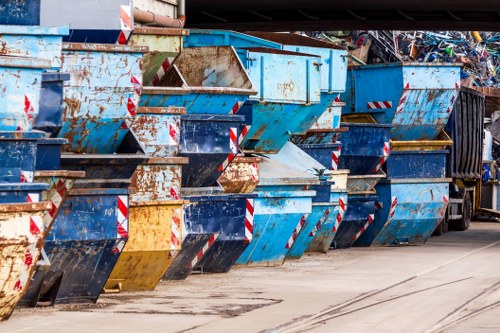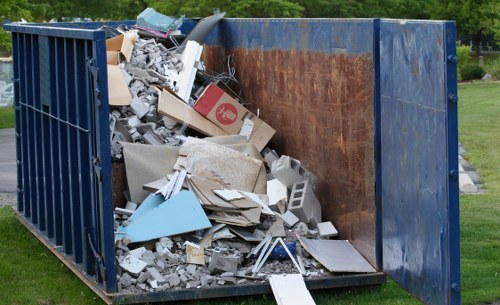Waste Recycling Aldershot: A Comprehensive Guide

Aldershot, a vibrant town in Hampshire, is not only known for its rich history and beautiful landscapes but also for its commitment to sustainable waste management. Waste recycling in Aldershot has become a cornerstone of the community's efforts to protect the environment and promote a greener future.
Recycling plays a crucial role in reducing the amount of waste that ends up in landfills. By reprocessing materials like paper, plastic, glass, and metals, Aldershot minimizes environmental pollution and conserves natural resources. The town's proactive approach serves as a model for other communities striving for sustainability.
The local government, along with various organizations, has implemented numerous recycling programs and initiatives. These efforts ensure that residents have easy access to recycling facilities and are well-informed about best practices. Aldershot's comprehensive waste recycling system is designed to accommodate different types of waste, making it easier for everyone to participate.
The Importance of Waste Recycling

Waste recycling is essential for several reasons. Firstly, it helps in reducing the volume of waste generated by households and businesses. This reduction leads to fewer landfills, which are often sources of soil and water contamination. By recycling, Aldershot significantly decreases its environmental footprint.
Secondly, recycling conserves natural resources. Materials like timber, water, and minerals are finite resources. Recycling ensures that these resources are reused efficiently, reducing the need for raw material extraction. This conservation is vital for maintaining ecological balance and supporting future generations.
Moreover, recycling has economic benefits. It creates job opportunities in the recycling and manufacturing industries. Aldershot's recycling sector contributes to the local economy by promoting green jobs and fostering innovation in waste management technologies.
Environmental Benefits
Recycling helps in lowering greenhouse gas emissions. Manufacturing products from recycled materials generally requires less energy compared to producing them from virgin resources. This energy efficiency leads to a significant reduction in carbon dioxide emissions, which are major contributors to climate change.
Energy Conservation
By recycling materials like aluminum and paper, Aldershot conserves energy. For example, producing aluminum from recycled materials uses 95% less energy than creating it from raw bauxite ore. This substantial energy saving is critical in the fight against global warming.
Types of Waste Recycled in Aldershot

Aldershot handles various types of waste, each requiring specific recycling processes. Understanding these categories helps residents sort their waste effectively, ensuring that recyclable materials are processed correctly.
1. Paper and Cardboard: This includes newspapers, magazines, office paper, cardboard boxes, and other paper products. Properly recycling paper helps reduce deforestation and conserves water used in paper production.
2. Plastics: Commonly recycled plastics include bottles, containers, and packaging materials. Recycling plastic reduces the demand for new plastic production and minimizes plastic pollution in the environment.
Glass and Metals
Glass bottles, jars, and various metal items such as cans and aluminum foil are also recyclable. Recycling glass and metals not only conserves natural resources but also reduces the energy consumption associated with manufacturing new products.
Electronic Waste
Electronics like old computers, televisions, and smartphones contain valuable materials that can be recovered and reused. Proper disposal and recycling of electronic waste prevent toxic substances from harming the environment.
Organic Waste
Organic waste, including food scraps and yard waste, can be composted to create nutrient-rich soil. Composting helps reduce landfill waste and provides a sustainable way to manage biodegradable materials.
Aldershot's Recycling Facilities and Services

Aldershot boasts a network of recycling centers and services designed to make recycling convenient for its residents. These facilities are equipped with the necessary infrastructure to handle various types of recyclable materials efficiently.
The Aldershot Recycling Centre is the primary hub where residents can bring their recyclable waste. The center is equipped with sorting lines and processing equipment to handle different materials. Staff members assist in ensuring that waste is correctly sorted and processed.
In addition to the main recycling center, Aldershot offers curbside recycling services. This service allows residents to separate their recyclables from regular waste, which are then collected regularly by municipal services. Curbside recycling programs enhance participation rates and simplify the recycling process for households.
Special Collection Services
Aldershot also provides special collection services for items that are not handled by regular recycling programs. These include bulky items like furniture, appliances, and other large electronics. Scheduling a special collection ensures that these items are recycled or disposed of responsibly.
Recycling Education and Outreach
Education is a critical component of Aldershot's recycling strategy. The town organizes workshops, seminars, and informational campaigns to educate residents about the importance of recycling and how to participate effectively. These initiatives aim to foster a culture of sustainability within the community.
Challenges in Waste Recycling

Despite its robust recycling programs, Aldershot faces several challenges in waste management. Addressing these obstacles is crucial for maintaining and improving the town's recycling efforts.
Contamination: Contaminated recyclables, such as food-soiled containers or mixed materials, can reduce the efficiency of recycling processes. Contamination requires additional sorting and can lead to recyclable materials being discarded as waste.
Public Participation: Ensuring consistent participation from all residents is a challenge. Some individuals may not be aware of recycling guidelines or may find it inconvenient to separate their waste properly.
Funding and Resources
Maintaining and expanding recycling facilities requires adequate funding and resources. Economic constraints can limit the ability to invest in new technologies, expand services, or enhance educational programs.
Technological Limitations
Advancements in recycling technology are necessary to handle a broader range of materials efficiently. However, keeping up with the latest technologies can be both costly and technically challenging.
Legislation and Policies
Compliance with national and regional waste management policies requires continual adaptation of recycling practices. Navigating the complexities of legislation can be a hurdle for local authorities.
Solutions and Future Plans
To overcome these challenges, Aldershot is implementing several strategies aimed at enhancing its recycling programs and ensuring long-term sustainability.
Improving Public Awareness: Increased efforts are being made to educate the community about the benefits of recycling and the proper methods of waste separation. Public awareness campaigns leverage various mediums, including social media, local newspapers, and community events.
Enhancing Recycling Facilities: Investments in advanced recycling technologies are planned to improve the efficiency and capacity of recycling centers. Upgrading equipment will enable Aldershot to process a greater variety of materials and reduce contamination rates.
Incentive Programs
Introducing incentive programs can motivate residents to participate more actively in recycling initiatives. Rewards for households that consistently recycle correctly can encourage better waste management practices.
Partnerships with Local Businesses
Collaborating with local businesses and industries can bolster recycling efforts. Businesses can contribute by adopting sustainable practices, participating in recycling programs, and supporting community initiatives.
Expanding Recycling Services
Plans are underway to expand the range of recyclable materials handled by Aldershot's recycling programs. Including items like textiles, batteries, and hazardous waste will further decrease the town's environmental impact.
The Impact of Recycling on Aldershot
Aldershot's commitment to waste recycling has yielded significant positive outcomes for the community and the environment.
By reducing the volume of waste sent to landfills, Aldershot has minimized its environmental footprint. This reduction helps preserve local ecosystems and reduces the risk of pollution. Moreover, recycling has fostered a sense of responsibility and environmental stewardship among residents.
Economic benefits are also evident. The recycling sector has created jobs and stimulated local businesses involved in waste management and recycling processes. Additionally, recycling initiatives have attracted investment in green technologies and sustainable practices.
Social Benefits
Recycling programs promote community engagement and collaboration. Volunteers and local organizations work together to ensure the success of recycling initiatives, strengthening community bonds and promoting collective action towards environmental goals.
Health Benefits
Proper waste management reduces the spread of diseases and minimizes exposure to harmful pollutants. By maintaining clean and safe environments through effective recycling, Aldershot enhances the overall health and well-being of its residents.
Environmental Preservation
Recycling helps preserve natural habitats and biodiversity by reducing the need for raw material extraction and minimizing habitat destruction. Aldershot's efforts contribute to the broader goal of environmental conservation and sustainability.
Nearby Areas and Their Role in Waste Recycling
Aldershot is surrounded by several nearby areas that play a pivotal role in the town's waste recycling ecosystem. Each of these areas contributes uniquely to the overall sustainability efforts.
- Camberley: Located just north of Aldershot, Camberley offers additional recycling facilities and serves as a key partner in regional waste management.
- Fleet: To the south, Fleet collaborates with Aldershot in organizing large-scale recycling drives and community clean-up events.
- Frimley: Frimley's residents actively participate in Aldershot's recycling programs, enhancing the town's recycling rates.
- Sherborne: Sherborne provides specialized recycling services for electronic and hazardous waste, supporting Aldershot's environmental initiatives.
- East Hampshire: This area supplies recyclable materials from rural households, increasing the diversity of recyclable waste handled by Aldershot.
- Cove and Southwood: Known for their active environmental groups, Cove and Southwood contribute to educational campaigns and recycling awareness in Aldershot.
- Chobham: Chobham's proximity allows for easy transportation of recyclable materials to Aldershot's facilities.
- Blackwater: Blackwater supports Aldershot by providing additional manpower during major recycling events and initiatives.
- Hardley: Hardley participates in Aldershot's organic waste composting programs, contributing to the town's sustainable gardening practices.
- Bordon: Bordon's industrial sector collaborates with Aldershot in recycling industrial waste, enhancing the town's overall recycling capacity.
- Rowhill: Rowhill hosts workshops and seminars in collaboration with Aldershot to educate residents about effective recycling techniques.
- Bijou: Bijou's community centers function as drop-off points for various recyclable materials, facilitating easier participation in recycling programs.
- Kestrel Ethon Wood: This area promotes recycling through its local schools, integrating waste management education into the curriculum.
- Central Aldershot: The town center actively participates by implementing recycling bins in public spaces and organizing city-wide recycling campaigns.
Getting Involved in Waste Recycling
Everyone in Aldershot can contribute to the town's recycling efforts. Whether through proper waste separation, participating in community clean-ups, or educating others about the importance of recycling, individual actions add up to significant environmental benefits.
Residents are encouraged to familiarize themselves with the types of recyclable materials and the correct methods of disposal. Utilizing the available recycling facilities and services ensures that recyclable waste is properly managed and processed.
Moreover, volunteering for local recycling initiatives or supporting organizations that promote sustainability can further enhance Aldershot's recycling outcomes. Collective efforts make a substantial difference in achieving environmental goals.
Tips for Effective Recycling
- Always rinse and clean recyclable containers before disposing of them.
- Separate different types of materials to minimize contamination.
- Stay informed about Aldershot's recycling guidelines and updates.
- Reduce waste by opting for reusable products whenever possible.
- Encourage neighbors and friends to participate in recycling programs.
Reducing Waste Beyond Recycling
While recycling is essential, reducing waste generation is equally important. Adopting practices like minimizing single-use plastics, repairing items instead of discarding them, and choosing sustainable products can significantly decrease the amount of waste that needs to be managed.
Composting Organic Waste
Composting is a simple yet effective way to manage organic waste. By turning food scraps and yard waste into compost, residents can enrich their soil and reduce the amount of waste sent to landfills. Aldershot provides resources and guidance to help residents start their composting projects.